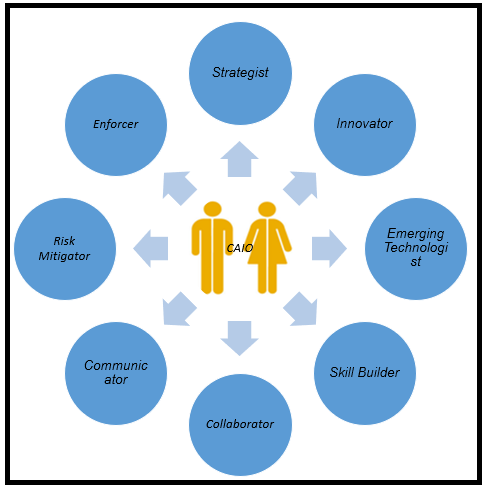
Artificial Intelligence (AI) Technology is changing the way the world does business. Artificial Intelligence (AI) refers to the use of AI to create new content, like text, images, music, audio, and videos.
AI helps in enhanced customer experience and improved employee productivity, automate business processes and cost efficiency. These are the essential components of Organization Strategy that every business needs. All these demands the need for a Chief Artificial Intelligence Officer (CAIO).
CAIO is responsible for Organizations overall AI Strategy and guides the development and implementation of AI technologies. They have a complete view of business processes and enable these processes with effective AI tools and AI processes. CAIO’s acts like a bridge between technology and business and helps in driving AI roadmap of businesses.
CAIO is an executive at the Organization level. They would have earlier worked as Chief Data Officer (CDO) or Chief Data Analytics Officer (CDAO) or Chief Technology Officer (CTO) or Chief Enterprise Architect (CEA). CAIO is responsible for ensuring AI Strategies align with Organization’s overall business objectives.
According to Lan Guan, “Every organization should have a chief AI officer or someone in that capacity, as it’s an essential role to bringing your company’s transformative vision to life by fully tapping into your own data combined with a holistic strategy of using AI.” – CAIO at Accenture.
Recently, US President Joe Biden ordered every US agency to appoint a chief AI officer. The key points of this directive are,
- Every federal agency must appoint a chief AI officer who possesses significant expertise in AI.
- Agencies that have not yet appointed a chief AI officer must do so within the next 60 days.
- If an existing chief AI officer lacks the necessary authority to coordinate AI use within the agency, additional authority must be granted, or a new chief AI officer must be named.
- Chief AI officers will serve as senior advisers on AI initiatives within their respective agencies. They will monitor and inventory all agency uses of AI.
- Risk assessments will be conducted to evaluate whether AI applications impact various aspects, including safety, security, civil rights, privacy, and more.
Also, some of the leading companies like, Intel Corporation, IBM, Dell Technologies, eBay, Deloitte, Thoughtworks, United Health Group and GE Healthcare have created the role of Chief Artificial Intelligence Officer. Their primary job is to ensure that the company stays ahead of the curve and capitalizes on digital growth and transformation.
CAIO collaborates with business stakeholders, Software Architects, BU heads, Application Development Heads and Clients to provide an overall vision and roadmap of how AI will be used within the organization. CAIO delivers great value by cutting cost and complexity by aligning IT concerns and AI technology tools with the strategic business goals.
CAIO needs to have a deep knowledge of data science, machine learning and artificial intelligence, analytical and business skills. The CAIO is expected to play the role of Strategist, Innovator, Emerging Technologist, Problem solver, Collaborator, Strong Communicator etc…
Without CAIO: Organization Level Issues
In the absence of CAIO, the Organizations are facing the following issues,
- Siloed and ad-hoc AI software development driven by business units.
- Organizations cannot maintain proper alignment of business and IT.
- Inability to rapidly respond to AI technology changes driven by business/technology challenges.
- Siloed business use-case specific architectures leading to high application and infrastructure cost.
- Lack of Organization level AI reference architecture leads to ineffective decision-making.
- Data becomes siloed, obsolete and less useful in strategic decision making.
- Complex, fragile, and costly AI data interfaces between applications and data.
Characteristics of CAIO
CAIO’s are strong business leaders with excellent communication skills and ethical and legal knowledge. They have a strong understanding of businesses and know how to leverage AI to improve the bottom line of business. For any Organization, the following are the qualities that CAIO should possesses as shown in the below diagram,

Fig: Role of CAIO
Implementing all these qualities will enable the Organization to scale up and quickly meet the investment decision-making process to support mission and strategies.
As a Strategist, CAIO works with the CEO, senior executives, business leaders and strategic governance team to define the organization’s AI strategy, directions, and initiatives. This includes identifying the organization’s AI goals, developing a roadmap for achieving those goals, and allocating resources to AI initiatives.
Plays critical role in driving Organizations transformative change in following focus areas:
- Establishing AI Frameworks, standards, guidelines, principles, and reference architecture.
- Integrating AI with current operational framework in optimizing. efficiency, amplifying engineering productivity and driving innovation.
- Participates in industry standards bodies/consortia and helps shape standards and processes.
As an Innovator, CAIO’s acts like an Evangelist for AI adoption across organization. Need to go beyond imperative thinking to bring disruptive innovation. Identify new AI-driven opportunities and transform traditional business models. Oversee the hands-on implementation, integration and productization of AI solutions into Organization existing business processes, systems, workflows and/or products.
CAIO’s involve in selection of AI Tools suitable for business, product selection, product integration in broader organization landscape and guiding AI initiatives across the Organization. Also, ensure seamless deployment and adoption of the AI solutions.
As an Emerging Technologist, CAIO has deep technology expertise and is aware of developments and innovations with focus area of participating in industry/vendor standards bodies/consortia and help driving innovation and adoption. Need to stay at the forefront of technological advancements covering Cloud Computing, Quantum Computing, Edge AI and Generative AI Models.
Explore the use of emerging technologies to solve business problems in the form of,
- Investigating emerging technologies and innovations.
- Identifies emerging technologies suitability for adoption within the organization.
- Guide pilot and proof-of-concept projects leading to implementation.
As a Skill Builder, CAIO develops a team of AI professionals with diverse skill sets. CAIO needs to promote “AI First Culture” to foster innovation across the organization. Need to educate business stakeholders, cross functional teams about the benefits of AI adoption, optimization of processes, streamlining of operations and industry trends.
Collaborates with cross-functional teams, data scientists, engineers, business leaders and external partners to enable organizations to derive maximum value from AI investments. Ensuring that the team has the appropriate skills to identify, manage, govern, and report on AI risks and controls.
Need to build a strong team that can effectively implement AI initiatives and drive innovation.
As a Collaborator, CAIO builds and maintains relationships with key stakeholders, such as customers, partners, and regulators. They ensure collaboration between IT teams, data teams and business. Leverages AI technology to meet the business objectives of an organization. Ensures the collected data to be transformed into actionable insights and drives informed decision making.
As an Effective Communicator, communicate the value proposition of AI both internally and externally. Communicate about standards, principles, reference architecture adoption to the respective stakeholders across organization. The effective communication channels are AI Newsletters, Establishing AI Chat groups within Organization, Publishing success stories and industry trends etc.
As a Risk Mitigator, CAIO acts as a guardian against AI related risks. The focus areas are:
- Executes and participates in AI project review and approval processes at designated and ad-hoc review points.
- Validate AI architecture designs/alternatives and give recommendations.
- Establishing measurable criteria to evaluate AI use cases against potential value and risks.
- Ensuring that AI initiatives adhere to legal and ethical standards.
As an Enforcer, CAIO Enforces compliance to AI standards with following areas of focus,
- Defines and governs AI initiative review and approval processes that include explicit architecture review and sign-off tollgates, including active participation in hardware and software purchases.
- Promote ethical AI practices, fairness, transparency and accountabilityin AI development and deployment.
- Provides final decisions on issues involving non-compliant projects; reviews overall cost, effort and risk issues associated with exceptions and makes directional decision.
- Ensure organization could troubleshoot and resolve disruptions in AI-enabled processes.
Summary
CAIO’s position is relatively new and still evolving. CAIO’s guide the Organization in leveraging AI to drive business transformation in digital world. Handles overall AI strategy development and implementation. Strive to master all the qualities like, innovative, ability to execute, tech savvy and agile minded. CAIO serves as a catalyst for change, fostering a culture of AI-driven innovation and propelling businesses into the future. Make right decisions in terms of accepting the right quality of data, overview of the portfolio in terms of applications, infrastructure and selection of the AI adoption tools.
The top skills of CAIO’s are,
- Strong technical skills in AI and data analytics.
- Deep knowledge of machine learning algorithms, neural networks, natural language processing, Retrieval Augmented Generation (RAG) and Robotics.
- Deep understanding of the ethical and regulatory considerations associated with AI.
- Strong understanding of businesses and how AI can be used to improve a business.
- Establish guidelines and policies to ensure that AI addresses privacy, fairness, and transparency.
The most successful chief AI officers need to combine their technical and AI expertise with business/operational skills.
Acknowledgements
The author would like to thank Santosh Shinde of BTIS, Enterprise Architecture division of HCL Technologies Ltd for giving the required time and support in many ways in bringing this article as part of Architecture Practice efforts.
About Author
Dr. Gopala Krishna Behara is a Enterprise Architect in BTIS Enterprise Architecture division of HCL Technologies Ltd. He has a total of 28 years of IT experience. Reached at gopalakrishna.behara@hcl.com
Disclaimer
The views expressed in this article/presentation are that of authors and HCL does not subscribe to the substance, veracity or truthfulness of the said opinion.
